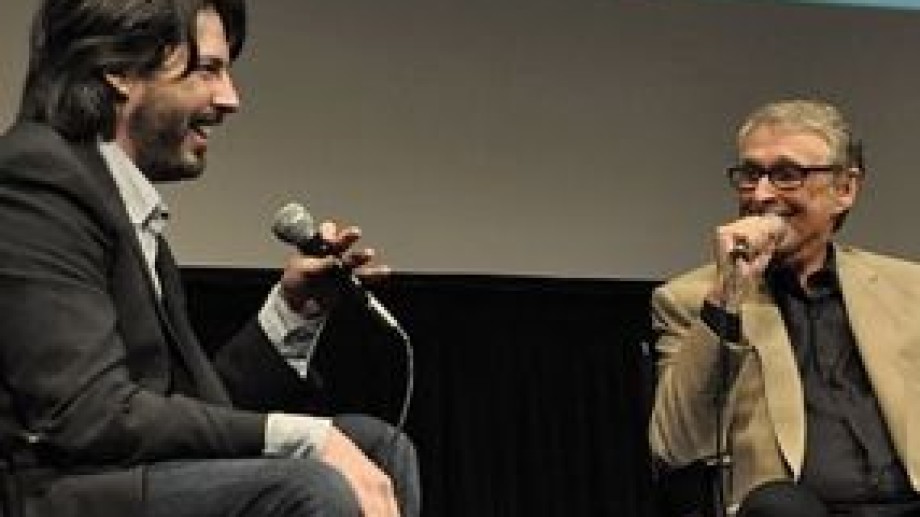
Editor’s Note: Oscar-winning director Mike Nichols took part in a lively conversation with Jason Reitman back in June 2011 at the Walter Reade Theater, discussing his 1971 film Carnal Knowledge and other topics. Today we’re re-posting the article by Daniel Loria in the wake of the news he passed away Wednesday night. The Film Society is saddened by the news.
A candid Mike Nichols sat down with Jason Reitman on Sunday night at the Walter Reade Theater during a weekend of free events at the Film Society.
“First of all, Jack [Nicholson] had a hot tub and I don’t have to say anymore about that,” Nichols explained at one point, “Secondly, Artie [Garfunkel] was over there all the time and he had a girlfriend we were all terrified of. But he didn’t have her for very long… because Jack somehow took care of that, too.”
The two filmmakers sat down for a conversation following the screening of Nichols’s explosive Carnal Knowledge, the controversial film starring Jack Nicholson, Art Garfunkel and Ann-Margret. Nichols was very open and willing to share some of the fun anecdotes from the set, a shoot which he described as the most enjoyable he’s had in his career. According to Nichols, the morale on the set was always high and everyone seemed to get along perfectly with one another. Days would end at three or four in the afternoon, and usually included leisurely meals at restaurants. “Jack had some nude scenes,” revealed the director. “They’re not in the film anymore but they were hilarious. He’d go up and say, ‘Alright! Here comes Steve, get ready for him!’ and he’d make such a fool of himself that everyone else would be cool.”
Nichols came upon Carnal Knowledge after a trio of strong films to start his career. The success of Who’s Afraid of Virginia Woolf?, The Graduate and Catch 22 gave the filmmaker the opportunity to take more risks with his next film. “It was one of the few films where I knew exactly what I was going to do as soon as I read it.” The result was a film that, according to Reitman, is more controversial today than it was upon its original release.
“I look at this film and it really upsets me there’s no films like this out. This is the most honest film I’ve ever seen, the way it looks into the male mind. Do you think this film could be made today?” Reitman asked.
“I don’t think so,” answered the veteran director. “Among other things, it wouldn’t be entertaining.”
“Was the idea for this to be entertaining?”
“Well yeah, as long as it could be,” Nichols answered, “I didn’t want them to be looking when the trap was sprung. I wanted them to be thinking of something else -Ann-Margret’s top, for instance. The more I could get them to look at her, the more they would be complicit in what happens to her.”
In Carnal Knowledge, Nichols guides and manipulates the audience to go to uncomfortable places. Reitman expressed his own desire to go back to an age when he felt filmmakers had more of a liberty to take risks in possibly alienating their audience, “I’m close to the age that you were when you made this film, and I want to do that to an audience,” shared the director of Thank You for Smoking. “I don’t pretend I can make something this brilliant, but what I love is how this film upsets me.”
“I think it’s still possible,” answered Nichols. “The thing that usually gets us is a simple thing. To be upset in the Greek sense, that gets you in a way that you don’t have the words for, is one of the reasons we’re here. I’m about to do Death of a Salesman, so God help me because I’m about to find out if we can still pull off such a thing and if anybody is willing to come with us.”
Nichols sees the renaissance in television as a new outlet for narrative risks otherwise unseen, “A great thing is happening on cable TV. You see characters change in stories over years, like in Tolstoy. That’s a whole, thrilling new form that I really enjoy. They are Tolstoy-an in their endless character development and narrative changes…a show like Breaking Bad is astonishing.”
Film, however, is a different question altogether. Reitman showed caution at labeling recent cinema to be as truly groundbreaking as some of the work coming from the young directors of the 1970s, to which Nichols replied with a compelling counterpoint. “It’s very weird about movies: you never know which ones are going to stay alive and which one are going to be meaningless,” said Nichols. “When you’re there you couldn’t possibly predict it. Some things slowly die and others slowly stay a while.”
Pictured above: Mike Nichols at the Film Society of Lincoln Center on Sunday night. Photo by Godlis.



